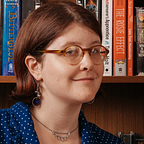Ingratitude can also help you
Embracing lament in the age of positivity
“It is better to light a candle than to curse the damn darkness,” was advice I once believed in entirely. I was raised to be an optimist. If you couldn’t change something, don’t complain about it. If you can change something: get to work! I saw my mother and my grandmothers keep a “stiff upper lip,” through the ups and downs of life, and I wanted to be just like them.
In my twenties, my church friends introduced me to the practice of “gratitude journaling,” and it became a key part of how I kept my upper lip stiff. Every evening I would light a scented candle, play some soft music, and write in a beautiful notebook all the things I was grateful for having. I would thank God for my friends and family, for my cosy apartment and my quiet life. I would “practice mindfulness” and thank Him for everything from the scent of my candle to the colors of the sunset.
The only problem: I was miserable. At the time I was keeping my gratitude journal, I wasn’t getting love or respect from my then-husband or fulfillment from my then-work or understanding from the friends who knew nothing of my then-woes.
But I firmly refused to think about any of that. I didn’t have the courage to think about it. I preferred to remain in denial. And as long as I was thanking God for the colors of the sunset, I was able to distract myself from the pit of darkness my life was becoming and my feeling of helplessness about escaping from it.
My college ex-boyfriend from India once taught me a proverb from his country, “The worst possible boss is one who can make you feel happy while shoveling shit.” I was astonished when he first cited this proverb to me. I said, “Wouldn’t that be a wonderful boss, someone who can motivate and inspire you even while you’re doing the worst possible tasks? Wouldn’t that be the ideal boss, in fact?”
His eyes twinkled a little as he set me straight. “If you’re happy shoveling shit, you’ll never reach for anything better, anything greater. So this boss is the ultimate obstacle to bettering yourself: that’s why they’re the worst.”
I know the scientific studies that have been done on gratitude: that it strengthens relationships, health, sleep, resilience, and self-esteem, that it reduces aggression. But another word for aggression is ambition. Plenty of people could stand to be less aggressive and ambitious, true — but there’s a huge population of (primarily woman) who need to learn how to be a little more aggressive.
Did the American revolutionaries sit down with their gratitude journals and write about how grateful they were that King George was only raising taxes so high? “The king could have raised the taxes ever so much higher. My my, I am so grateful that His Majesty has not yet taken those measures. And how blessed I am that I can still afford my one little cup of tea every week! It is delicious. And unlike so many other unfortunate souls, I still have my wee spoonful of sugar to stir into it.”
Imagine how different history would have been if Patrick Henry and John Adams and Thomas Jefferson and all the rest of those bozos had been writing shit like that in little flower journals!
That, in a nutshell, is how virtue is defined differently for different people. When John Adams demands liberty, he’s a hero. When Abigail Adams demands it, she’s “saucy.” (That little spitfire, Abigail. She would’ve made such a great second president.) When a slave demands it, he’s dead. ::bows head to grieve::
And yet as I was walking to the BART today, I was struck with gratitude by how the sunlight blazed through a clump of weeds under the freeway. These simple leaves were brighter than the brightest emeralds. I remembered as a child how I would flee into the woods to feel free and happy. The sight of those leaves made me a child again, restoring some of the wild and youthful joy that gave me the courage to devour life even on the loneliest days.
The leaves had interrupted with their emerald splendor some somber reflections on heartbreaks old and new. Like a leaf reaching towards the sunshine, I asked God how to escape the swamp of my regrets.
God asked me how I liked the new person I had become on the other side of my heartbreaks. The question had not occurred to me before and I noticed with some surprise how I was more creative, more honest, more courageous, and more soft-hearted than I had ever been before. I still didn’t like what had happened to me: but for the first time ever, I was grateful for myself.
I won’t be grateful that all I have is my own little candle. But I am so, so grateful for the voice God gave me to curse the damn darkness.
